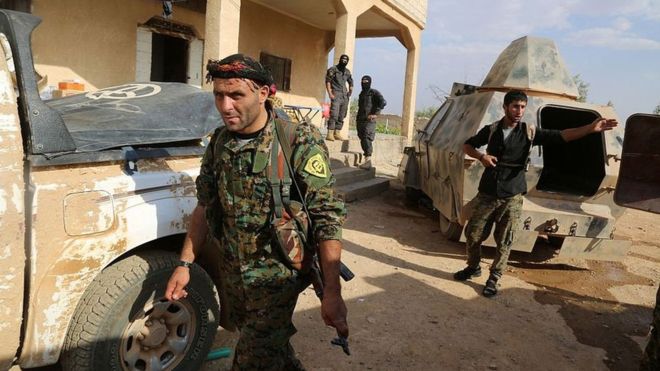The American campaign to remove the Islamic State from northern Syria continues to be complicated by the various armed groups and allegiances on the ground.
Turkey, a critical ally for the United States in counter-terrorism operations in the region, has expressed great concern over American support for the Kurdish YPG, an armed group fighting against the Islamic State that Turkey considers a terrorist organization.
According to Turkey, the YPG is a close associate with the Kurdistan Workers Party (PKK), which has conducted a series of terrorist attacks and is waging an ongoing insurgency inside Turkey.
Turkish Prime Minister Binali Yildirim called the American support for the YPG ‘unfortunate’ in a news conference yesterday.
The situation in northern Syria is changing rapidly. As the Assad government regains its footing to resume its offensive against the Syrian opposition as a whole, infighting has begun among the individual groups for remaining territory and resources.
The United States finds itself in a particularly difficult situation. Not wanting to escalate American troop involvement in the conflict, the U.S. has had to rely on local fighters to carry the fight to the Islamic State. Over the past few years, this policy has had minimal success, as the Arab militias the U.S. would prefer to bear the brunt of the fighting have been largely insignificant on the battlefield.
According to the Turks, the Americans have now turned to the Kurds, an ethnic group in northern Iraq and Syria that has a reputation for reliable and disciplined fighters, and given weapons to the YPG.
Turkey entered the war last year to eliminate ISIS from the Syrian-Turkey border, but also to prevent the YPG from consolidating in the territory once cleared of the Islamic State.
The quickly overlapping involvements of the U.S., Turkey, and Russia prompted a meeting between Chairman of the Joint Chiefs of Staff Joseph Dunford with his Russian and Turkish counterparts. The purpose of the meeting was to deconflict operations between the major powers and discuss “the fight against all terrorist organizations in Syria.”
In an unusually public move, members of the 75th Ranger Regiment were seen flying American flags from atop their Stryker Infantry Carrier Vehicles near the Syrian town of Manbij, which was meant as a “visible sign of deterrence and reassurance,” according to Pentagon Spokesman Captain Jeff Davis.
The effort to untangle the numerous allegiances and rivalries between armed groups in Syria will undoubtedly prove to be a difficult task leading up to the eventual assault on Raqqa, the de facto capital of the Islamic State.
Already have an account? Sign In
Two ways to continue to read this article.
Subscribe
$1.99
every 4 weeks
- Unlimited access to all articles
- Support independent journalism
- Ad-free reading experience
Subscribe Now
Recurring Monthly. Cancel Anytime.
According to the Turks, the Americans have now turned to the Kurds, an ethnic group in northern Iraq and Syria that has a reputation for reliable and disciplined fighters, and given weapons to the YPG.
Turkey entered the war last year to eliminate ISIS from the Syrian-Turkey border, but also to prevent the YPG from consolidating in the territory once cleared of the Islamic State.
The quickly overlapping involvements of the U.S., Turkey, and Russia prompted a meeting between Chairman of the Joint Chiefs of Staff Joseph Dunford with his Russian and Turkish counterparts. The purpose of the meeting was to deconflict operations between the major powers and discuss “the fight against all terrorist organizations in Syria.”
In an unusually public move, members of the 75th Ranger Regiment were seen flying American flags from atop their Stryker Infantry Carrier Vehicles near the Syrian town of Manbij, which was meant as a “visible sign of deterrence and reassurance,” according to Pentagon Spokesman Captain Jeff Davis.
The effort to untangle the numerous allegiances and rivalries between armed groups in Syria will undoubtedly prove to be a difficult task leading up to the eventual assault on Raqqa, the de facto capital of the Islamic State.
Image courtesy of BBC










COMMENTS